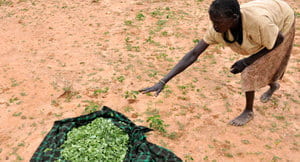This article by CCLP senior fellow Dan Glickman was originally published on Politico.
How do you feed 10 billion people? It is not just a humanitarian question, but a vital U.S. national security imperative.
A recent U.N. report projects a 46 percent population increase by 2100. Africa, home to more than a quarter of the world’s undernourished people and more than 20 violent conflicts in the past half century, is predicted to more than double its population. We must not only consider how to feed all of these people — but what it means if we can’t.
Food commodity prices are at record highs, leading to instability in already volatile regions. The Pentagon’s Quadrennial Defense Review warns that factors like “climate change will contribute to food and water scarcity” even more in future, leading to “further weakening of fragile governments.”
 Photo credit: Reuters
Photo credit: ReutersClearly, there is reason for the U.S. to get even more aggressive in addressing global food security. Food supply stresses represent an increasing national security threat and are not going away.
These increasing food prices are one likely catalyst of the Middle East upheaval. Last August, for example, Russia banned all wheat exports — including 600,000 tons of outstanding Egyptian orders. Egyptian food prices spiked dramatically – in a country where food is already 38 percent of consumer expenditures, compared to 13 percent in the U.S.
Washington cannot allow food insecurity to exacerbate instability in already volatile regions. We are not doing all that must be done. U.S. policymakers are taking the right, first steps, according to our new report, but more resources as well as long-term commitment are needed.
We are issuing a report card on U.S. efforts to alleviate global hunger and poverty through agricultural development programs. Washington received an overall grade of just B-.
The U.S. has earned praise since 2009 for progress on USAID effectiveness, interagency coordination and support for agricultural education and infrastructure, particularly in Sub-Saharan Africa.
But Washington still lacks strong efforts to reform policies impeding the development of global sustainable agricultural infrastructure. These include failures to repeal restrictions on aid that might lead to exports of certain commodities or change policy on subsidies that reduce the cost of farming inputs, like seed and fertilizer. We also need to address the continuing biofuels policy — which encourages growth of food crops for fuel. America’s efforts to build partnerships between universities in the U.S. and Africa have been limited as well.
On our recent visit to Africa, we saw how modest investments by the U.S. government, working with nongovernmental organizations, international partners and African governments, can make a difference. In Mozambique, for example, just 16 percent of arable land is being used for agriculture and farms only yield an average of one ton a hectare — compared to six tons a hectare in the U.S. There is so much untapped potential.
Modest, strategic investments and targeted policy reforms can have a real impact by helping Africans tap into this potential. Every added $1 in agricultural production generates on average another $3 elsewhere in the economy. This multiplier effect is transformational not just for Africans, but Americans.
We understand Congress’ reluctance to stay engaged in global development during these troubled economic times. But, as Sen. Marco Rubio (R-Fla.) warned, “Disengaging from the world will end up costing us more.”
History shows this is true. U.S. agricultural assistance for South Korea in the 1960s, for example, “permanently transform a vulnerable and unstable country into a prosperous and secure partner.” South Korea has now a donor instead of aid recipient, and the seventh largest market for U.S. goods and services.
We hope Congress recognizes that even amid the spending debate, Washington must remain committed to U.S. leadership on long-term food security. These investments will pay off significantly by reducing food shortages, mitigating the risk of conflict and instability that threatens U.S. national security and ensuring future economic growth at home and abroad.
This article was co-authored by Catherine Bertini. Bertini served as executive director of the U.N. World Food Program 1992-2002. Dan Glickman served as agriculture secretary 1995-2001. They are co-chairman and -woman of The Chicago Council on Global Affairs’ Global Agricultural Development Initiative, which is releasing its 2011 report on U.S. leadership Tuesday at a symposium.